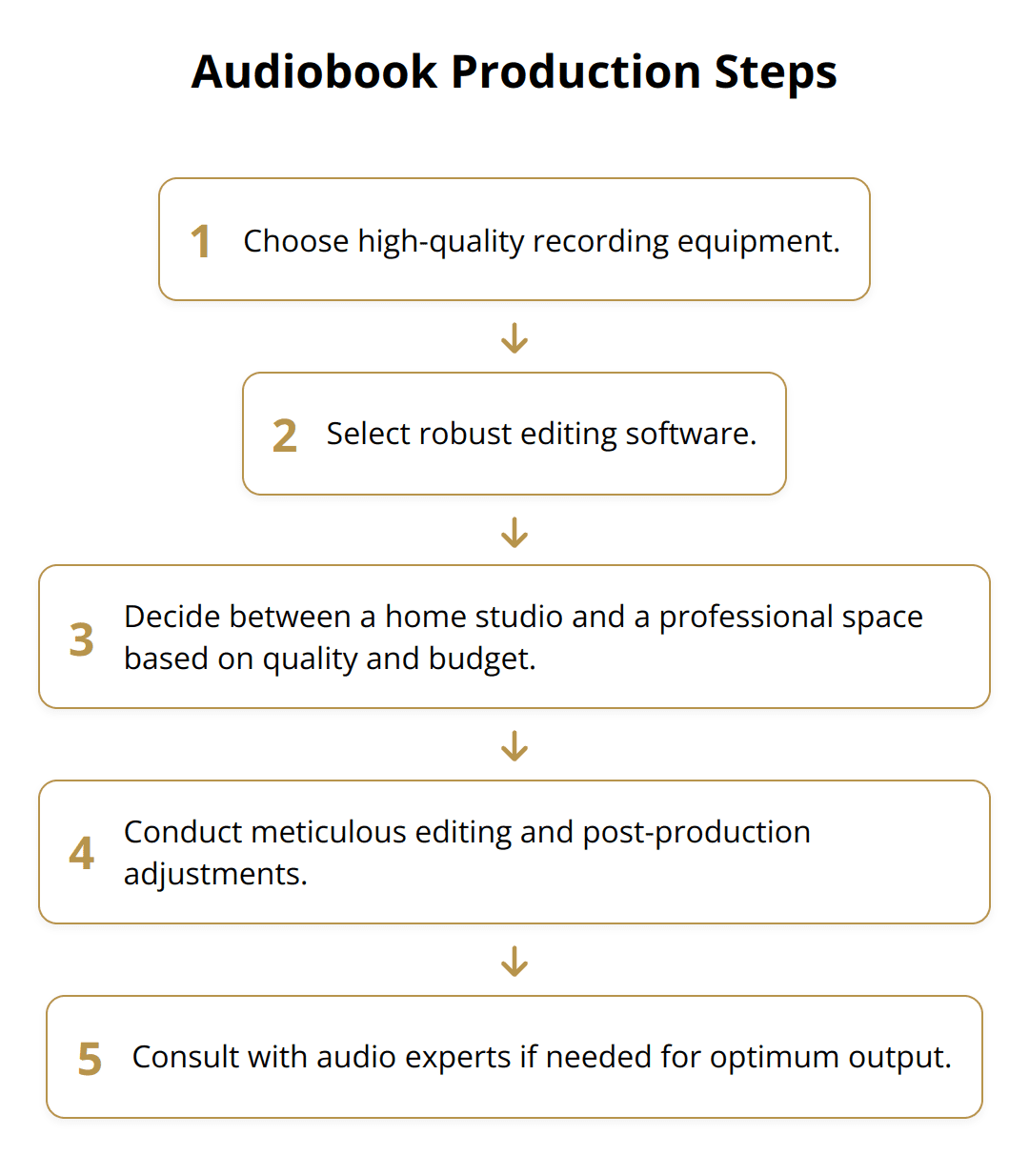Audio book production is an art that combines storytelling with technical prowess, making it a unique venture for any author. With the right approach, it can open up your work to an entirely new audience.
At Beverly Hills Publishing, we understand the importance of creating audio books that resonate with listeners. This post will guide you through the key steps, from choosing the perfect narrator to effectively marketing your final product.
Choosing Your Narrator
The voice behind your audiobook can make or break its success. Selecting the right narrator is not just about finding a voice that sounds pleasant; it’s about matching the voice with the tone and style of your book. Here’s how to ensure you make the best choice.
The Impact of Voice
The narrator’s voice carries your story to the ears of listeners, making the choice of who narrates your audiobook incredibly impactful. A well-chosen voice enhances the listener’s experience, making characters come to life and ensuring your message is conveyed effectively. Conversely, a mismatched narrator can disengage listeners and detract from the essence of your book.
Finding Professional Narrators
The search for a professional narrator requires attention to their experience, range, and previous work. It’s essential to listen to samples that showcase their ability to convey different emotions and characters. Many authors turn to platforms like ACX or Bunny Studio where you can find a diverse pool of talented narrators. The key is to ensure they have the right tone, pace, and energy that align with your book’s genre and narrative style.
Selection Criteria
When selecting a narrator, consider the following criteria:
-
Voice Match: Does the narrator’s voice suit the book’s genre and narrative style?
-
Character Portrayal: Can they convincingly portray your characters, capturing their personalities and emotional ranges?
-
Technical Skills: Do they have good pacing, clear diction, and the ability to maintain listener interest over long periods?
-
Feedback and Reviews: What do previous clients say about their work ethic, turnaround time, and collaboration process?
Tips for a Smooth Selection Process
-
Conduct Auditions: Request voice auditions with a short excerpt from your book to gauge how well they capture its essence.
-
Communicate Your Vision: Share your vision and expectations with potential narrators, including character notes and the book’s overarching mood.
-
Consider Listener Preferences: Think about your target audience. What type of voice are they likely to connect with?
Key Takeaways:
-
Quality Over Cost: Don’t compromise on quality for budgetary reasons. The right voice is worth the investment.
-
Check Compatibility: Ensure your chosen narrator is someone you can communicate well with, as you’ll need to work closely throughout the production process.

Your narrator is the bridge between your written words and your audience’s ears. Taking the time to choose wisely can significantly influence your audiobook’s appeal and success.
Technical Essentials for Audiobook Production
Once you’ve secured the perfect voice to bring your audiobook to life, it’s time to focus on the technical side of audiobook production. This phase is where your project transitions from a beautifully written manuscript to a professionally produced audiobook. Let’s explore the indispensable elements of recording equipment, software, and navigating the choice between home studios and professional spaces, along with pivotal editing and post-production considerations.
Recording Equipment and Software Necessities
The foundation of any good audiobook production lies in high-quality recording equipment and robust software. A professional-grade microphone is non-negotiable; it captures the nuances of the narrator’s performance, ensuring clarity and presence. Consider microphones that are widely recommended for vocal recording, such as those from the Shure SM and Audio-Technica AT series.
Equally important is selecting software that enables efficient recording and editing. Audacity and Adobe Audition are popular choices due to their comprehensive features and user-friendly interfaces. These tools allow for precise editing, noise reduction, and ensuring consistent audio levels throughout your audiobook.
Home Studio vs. Professional Space
The decision between setting up a home studio or renting a professional recording space can significantly impact your audiobook’s quality and production costs. A home studio, while more affordable, requires attention to acoustics. Simple adjustments, like using acoustic panels or recording in a closet filled with clothes, can enhance sound quality.
Renting a professional space, on the other hand, offers top-notch equipment and acoustically treated environments right off the bat. If you aim for the highest possible audio quality and lack the resources to optimize a home setup, this might be the best route. Remember, listener experience hinges on audio quality, so invest wisely.

Editing and Post-Production Essentials
The editing phase is where your audiobook truly comes together. It involves removing mistakes, balancing audio levels, and adding metadata for chapters. Adequate editing ensures a seamless listening experience, free from distracting background noises or uneven volume.
In post-production, fine-tuning with EQ adjustments and compression can make your audiobook sound polished and professional. However, beware of over-processing, which can detract from the natural quality of the narration.
Practical Tips:
-
Invest in Quality: Choose the best microphone and software your budget allows.
-
Optimize Your Space: Even minor acoustic improvements in a home studio can have a major impact.
-
Precision Editing: Focus on meticulous editing to ensure clarity and listener engagement.
-
Seek Expertise: If uncertain, consulting with an audio engineer can elevate your audiobook’s quality.
Mastering these technical essentials sets the stage for your audiobook to captivate and engage listeners, paving the way for its success.
Marketing Your Audiobook
Successfully launching your audiobook involves more than just great production; effective marketing is key to reaching your target audience and driving sales. In today’s digital world, you have a wealth of tools and platforms at your disposal. Understanding how to utilize them effectively can make all the difference in the success of your audiobook.
Harness the Power of Social Media
Social media is a versatile platform for audiobook promotion. Platforms like Instagram, Twitter, and Facebook offer direct ways to engage with your audience. For the best results:
-
Post Regularly: Consistency keeps your audience engaged and makes your content more likely to be seen.
-
Use Visuals: Share eye-catching images of your audiobook cover or teasers of audiogram snippets to grab attention.
-
Interact with Your Followers: Engagement increases visibility. Respond to comments and messages to build a community around your audiobook.
One effective strategy is to create a hashtag specific to your audiobook for use on all posts. This not only fosters community but also makes it easy for potential listeners to find all related content under one searchable tag.
Collaborate for Broader Reach
Reaching out to influencers and authors within your genre can significantly enhance your audiobook’s visibility. Look for influencers whose followers align with your target audience. A simple collaboration could range from them reviewing your audiobook to sharing a post about it. The key is to provide value in return, whether it’s through a reciprocal promotion or providing them with free access to your audiobook.
Moreover, joining forces with other authors for cross-promotion or guest appearances on each other’s social media channels can introduce your audiobook to entirely new audience segments.
Leverage Audiobook Platforms
Platforms like Audible and iTunes are powerhouses for audiobook discovery. To make the most of these platforms:
-
Optimize Your Listing: Use compelling descriptions, relevant categories, and keywords to make your audiobook easier to find.
-
Encourage Reviews: Reviews can significantly influence potential listeners. Politely ask your audience for reviews and consider offering review copies to audiobook bloggers or reviewers.
-
Use Promotional Codes: Many platforms offer ways to give out your audiobook for free to a select number of listeners, which can help generate buzz and reviews.
Additional Strategies
-
Email Marketing: This is an effective way to keep your audience informed about your audiobook’s release and promotional activities. Tools like Mailchimp make it easy to manage your email campaigns.
-
Paid Advertising: Investing in ads on social media or search engines can boost visibility among highly targeted audiences.

Practical Tips:
-
Prioritize social media platforms where your target audience is most active.
-
High-quality visuals and engaging audio samples are key.
-
Analytics tools can help track the effectiveness of your marketing efforts, allowing you to adjust your strategy as needed.

By adopting a tailored, strategic approach to marketing, you can increase your audiobook’s reach and sales, helping your story find its audience.
Wrapping Up
The journey into audiobook production combines technical skill with creative storytelling, offering a unique opportunity to extend the reach of your work. From choosing the right narrator to mastering the technicalities of recording and leveraging effective marketing strategies, the quality of each component plays a pivotal role in the success of your audiobook. It’s clear that high-quality production can significantly influence listeners’ engagement and their overall experience.
![Key Takeaways - Audio Book Production Tips [Pro Tips]](https://b3004418.smushcdn.com/3004418/wp-content/uploads/2024/05/Audio_Book_Production_Tips__Pro_Tips__5_2024_05_15_07_06_53_316822_00_00.png?lossy=1&strip=1&webp=1)
The voice that carries your story, the clarity of your audio, and the strategies you employ to introduce your audiobook to the world are all critical factors that require careful consideration and planning. Remember, investing in quality — be it through the selection of a narrator, the recording equipment, or the marketing approach — cannot be overstated. It is the quality that will set your audiobook apart in a crowded and competitive market.
As you venture into the world of audiobook production, let these insights and tips serve as your guide to creating an engaging, high-quality audiobook that resonates with your audience. It’s an investment that not only expands the accessibility of your work but also enhances your standing as an author.
At Beverly Hills Publishing, we understand the power of quality production combined with strategic marketing. Our integrated approach has helped countless authors achieve success beyond traditional publishing, establishing them as leading authorities in their fields. We’re committed to supporting you through every step of your audiobook production journey, ensuring your story not only reaches but also captivates your audience.
Embrace the opportunity that audiobook production presents. With the right focus on quality and a strategic approach to marketing, your work can transcend traditional boundaries, reaching new audiences and setting you on the path to becoming a recognized authority in your industry.















































































































































































































































